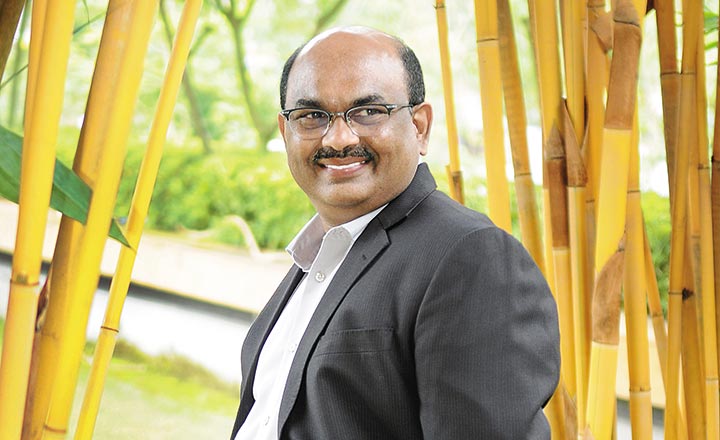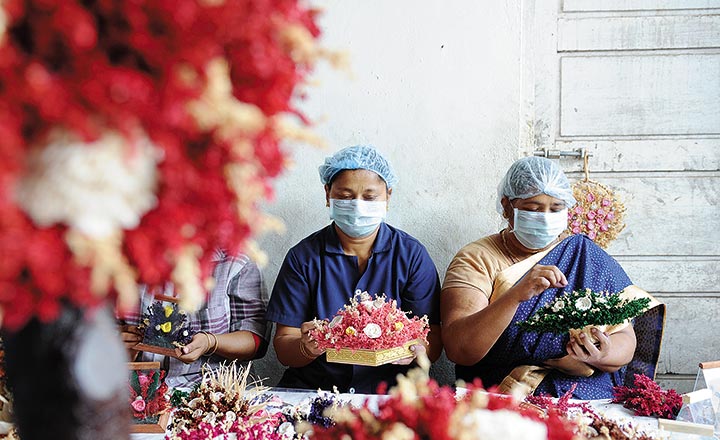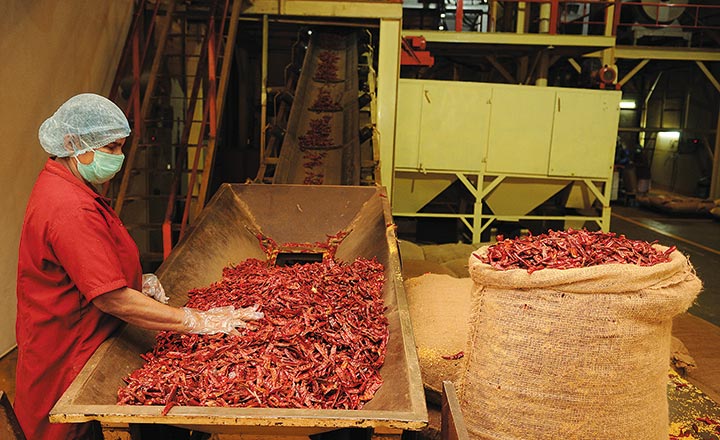When his cousin advised him to explore the spice oils (oleoresin) export trade in 1972, little did CV Jacob know that his venture would become a formidable flavours and fragrances manufacturer. Synthite Industries that began with producing pepper oleoresin, has transformed into a nearly Rs.1,800-crore powerhouse today. In a country that accounts for 70% of the global spice oleoresin market, Synthite ranks at the top of the current pecking order. Innovation and technological advancement guaranteeing impeccable product quality is its prime focus. Be it the introduction of oleoresin blends, or marigold extraction with varied applications, or setting up the first C02 extraction plant for food products in India, or adoption of nanotechnology, Synthite has several pioneering efforts to its credit. All this with the vision of reaching Rs.3,000 crore by FY20 and clinching the title of the undisputed value-added spice king
Savour it with your eyes first and breathe in the pungent aroma. Then dig your fork right in, swirl it along the tines and swoop it in. Wait a few seconds till it hits you. The searing heat of the pepper screams out loud in your mouth and a warm tear runs down your cheek. Uff! Hot and flavourful — that’s how Indians like their food and Nestle India’s newly launched range of ‘Maggi Hot Heads’ serves just that. But behind the vibrant packaging and the burst of intense flavours is Synthite, a Kochi-based company that contributes to the star ingredient, pepper. This is the company that has been satiating the taste buds of Indian food lovers by adding the right mix of flavours to your favourite Haldiram namkeen or enriching the colour of your preferred PepsiCo soda.
A company that started with 13 people extracting pepper oleoresin (Oleoresins are natural extracts of a spice or herb and are used as replacements for a whole spice, while providing the same flavour and aroma) in three vessels under the watchful eye of the founder, CV Jacob, now manufactures 500 products from spice powders, oleoresin blends for flavours and fragrances to herbal extracts. Synthite is now a diversified corporate entity with interests in hospitality and renewable energy. The world’s largest value-added spice player is situated on the outskirts of Kerala’s commercial hub, in Synthite Valley. Back in 1972, when CV Jacob settled in his hometown Kolenchery, the retired civil construction worker didn’t know much about the spice business. A cousin’s advice to explore the spice extraction business led him to invest Rs.5 lakh to start the company.
From then on, Synthite made the most of nature’s bounty in God’s own country and added more variants to its product portfolio, solely focusing on exports. By 1984, it bagged the award of the ‘top spices exporter’ from the state, a tradition still reflected in the countless mementos gracing the headquarters lobby. Viju Jacob, the eldest son of Jacob and the current managing director officially joined the company in 1984. “Since childhood, my father insisted that I spend time on the shop floor during my holidays. I didn’t appreciate it back then, but today I understand the value of the knowledge gained, since I can actively partake in product development decisions”, shares Jacob.
Seeking balance of flavours
Synthite has been very fortunate to have partnered with the right type of clients who introduced the company to opportunities never explored by its peers. One example is the marigold extract process initiated in the southern town of Coimbatore in 1984 as part of a joint venture with Cal Pfizer, a France-based firm that produced perfumes.

Apart from its fragrance, the flower extract finds its way in chicken feed to add a rich orange colour to the yolk of an egg and also as a health supplement to treat degeneration of the human eye. Today, Synthite manufactures a range of products from marigold for its industrial clients. Switzerland-based 120-year-old fragrance house, Firmenich, which has created popular fragrances for luxury labels such as Hugo Boss, Giorgio Armani and Ralph Lauren is one of its clients. Firmenich began sourcing ingredients from Synthite in the late 90’s and hasn’t looked for a replacement since.
A close look at Synthite’s journey would reveal that with a first mover advantage in some product categories, the company has cornered attractive clients. “At Synthite, we don’t like to copy competition. We like to do things differently to stand out,” Jacob elaborates. Kerala-based Akay Flavours and Aromatics, Plant Lipids, Arjuna Natural Extracts and Kancor are some of the other major players in the same segment. As per data from the Spices Board, Indian exports of spice oils, oleoresins and mint products amounted to $0.7 billion in FY16. A Jayathilak, chairman, Spices Board, says, “India tops the list of major spice oleoresins producing and exporting countries, contributing 65-70% to the global spice oleoresin market. Exporters from China, Vietnam, Indonesia, Sri Lanka, Brazil and the USA compete with the Indian exporters mainly in the export of paprika, ginger, turmeric, pepper and cinnamon oleoresins. The emphasis of Indian exporters on high quality and reliability of supply gives them an edge over their counterparts.”
Synthite currently leads the list of oleoresin exports from the country, as per data from the Spices Board. While it is a leading supplier in the flavours and seasonings global market, it also competes with its clients. For instance, Firmenich is a peer in the essential oils business and one of its oldest clients. Jayathilak adds, “Synthite is one among the top Indian spice exporters. In FY16, Synthite, in terms of value, contributed 29% to the Indian spice oleoresin market.”
Blending success
Back in 2002, the company introduced oleoresin blends, a mix of multiple spice extracts to develop a particular flavor, which also happens to be its best specimen. Jacob recalls the first few years when he and a colleague shuttled across the country hawking their new offering. “We would make presentations and people would simply listen to us, but nothing happened. Then we changed our approach and took along the product innovation team. They carried the product and ingredients and did live demos, that’s when things began to change,” he says.
Jacob explains how the oleoresin blends added Rs.120 crore to the topline by 2012 and today the domestic market contributes Rs.380 crore to the company’s revenue. Synthite began experiments for oleoresin blends in small quantities for flavours such as chicken tikka, barbecue, etc. with MNCs such as Nestle India, ITC, PepsiCo and Unilever. Today, the company has deployed a team of 80 employees who focus on product innovation alone. Nestle began its association with Synthite in 2009 by purchasing spice powders that later resulted in the brand’s dairy whitener product called ‘Masala fusion’. The MNC’s Sri Lankan market variants have a sachet of liquid seasoning of traditional flavours such as Chilli Chicken and Kottu prepared by Synthite. It has seen the spice powders business from the MNC grow from Rs.10 lakh in 2009 to Rs.2.4 crore in 2016. Today, Synthite boasts of a total installed capacity of 57,000 metric tonne across five factories in India and one in China. The company’s plant in China is solely for paprika extract, the one in Ongole, Andhra Pradesh does chilli and the two in Kolenchery, Kerala, manufacture its retail brands and other spice extracts.
Rising global footprint
While the domestic market gains hold a place of pride in Synthite’s balance sheet, it is the export market that brings in bulk of the money. Exports comprise 70% of the revenue earned for manufacturing and shipping products mainly to the United States and European countries followed by the Asia Pacific region. Synthite’s subsidiaries, Symega Flavours and Symega Savoury handle the bulk of these orders. Since Synthite aims to acquire a greater market share in the US, Europe and China, it has recently inaugurated a sales office in Amsterdam and commissioned a new factory in Vietnam.
When talking about the export trade, Jacob points out one niggling issue, “Of the total spices grown in India, only 8% is exported, the rest is consumed within the country itself. Countries such as China and Vietnam are surging ahead with government support in supplying better yielding seeds. Here, from one acre of chilli we are getting 600 kilos, whereas in China, you are getting 1,400-1,600 kilos.” The exchange rate fluctuations are also a cause for discomfort. “Is the government or the Spices Board supporting us in research or new product development?,” asks Jacob.

Despite these trade-specific challenges, Synthite has done quite well for itself in the global market. “Our clients trust our quality. I am not underestimating my competition, but I can confidently say that we are valued by our clients because of our history of innovation coupled with quality products,” Jacob proudly asserts. Donald Wilkes, founder, president and CEO of Blue Pacific Flavours, seconds this statement. The 35-year-old California-based food company manufactures organic, non-GMO extracts, flavours and essence of whole food ingredients. These are for clients in the bakery, confectionary, beverages, dairy and nutritional supplements industries.
“We have developed a coconut milk-based plant beverage that features Synthite’s proprietary water dispersible turmeric. It capitalises on the demand for a non-dairy plant-based beverage in the US with additional benefits of curcumin [a component of turmeric that is widely used for its medicinal properties]”, Wilkes says. What is it that made him sign up Synthite as a partner? “It is constantly innovating on processes and technologies to differentiate itself from its competitors,” he adds.
The company has a separate department called Farmtech, comprising 60-70 employees who research on high-yield producing seeds and run the company’s backward-integration program with farmers it sources its produce from. “About 70% of our product cost is the raw materials. So, we had to ensure we were sourcing the right ingredients from the farmers,” points out Jacob. The oleoresin manufacturer sources whole spices from around 5,000 farmers in India. The company has devised a thorough backward integration process wherein, they educate farmers about soil analysis, seed selection, provide pest management kits, educate them on the use of acceptable insecticides and right kind of fertilizers. Following this, the team including Jacob tracks the farm produce quality and prevalent market rates in local mandis.
New beginnings
The managing director is always found keenly screening products on the shelves of supermarkets abroad and keeping an open mind to client suggestions. It was a suggestion by a Japanese client that prompted Jacob to experiment with nanotechnology — a process of producing the bio-ingredients in nano dimensions to get better results in terms of the colour of a beverage by using the extract in a lower dosage. Synthite installed what the management claims is the world’s highest capacity CO2 extraction plant for spices in the world. “The shift we’re witnessing in the global market is that while solvent extraction is a widely accepted technology, countries like the US and Europe are demanding organic or solvent-free products,” Jacob explains. Unlike the conventional method where a hydrocarbon-based propellant or alcohol/ethanol mixture is used as a solvent, here CO2 does the job resulting in a residue-free product.
The company is also setting foot into retail trade with two brands under its subsidiary at vastly different price points — Intergrow Foods and Beverages. In April 2013, it began manufacturing a range of spice powders and blends, pickles, ready-to-cook food, culinary pastes, etc, under the brand ‘Kitchen Treasures.’ Second, it plans to target hotels, restaurants and catering businesses to further grow the brand. Currently available in Kerala and Karnataka, the company plans to serve the rest of south India in the next three years. Another line of products that has already found a place on shelves in high-end stores in metros is Sprig. This incorporates gourmet products including ingredients, condiments, seasonings, and pastes from Indian and continental cuisines. Jacob says, “We intend to expand our presence in more outlets and online portals. We will introduce more products that Indians are familiar with.”
While Synthite forges ahead with its revenue target for 2020, Jacob is clear he does not wish to lose another business opportunity. He recalls that when the second generation including himself joined the company post 1984, the company lacked a vision and a detailed growth plan. That gradually changed a decade later when the founder promoter allocated responsibility of different departments to individual directors and Jacob claims that focused drive helped Synthite. He talks about one lost business potential that he regrets. “It was in 1994, when our US partner in the marigold business suggested we open a factory in China. At that time, the board shelved the idea. Had we gone ahead then, we would have had the support of a US firm and that much more scope to explore what more we could bring to the market. We could have become a much bigger company by now,” he sighs.
But the Synthite management is clearly not one to hover over the past or rest on its past laurels. The company’s revenue has grown by 36% to Rs.1,778 crore in FY17 fueled by increasing spice oleoresin exports. It harbours a dream to reach Rs.3,000 crore by FY20 riding on the momentum in its valued-added spice business and its retail foray.











